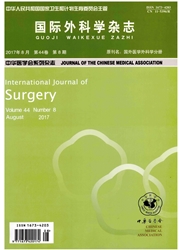

 中文摘要:
中文摘要:
肝脏缺血再灌注损伤是肝脏外科常见的病理生理过程,是集肝窦血管内皮损伤、氧化应激、炎症反应、细胞凋亡与自噬等多种机制共同作用的结果,对于肝切除、肝移植等肝脏外科手术后肝功能恢复和围手术期安全具有显著影响.然而,迄今为止,其具体的损伤机制尚未完全阐明,在临床上也始终缺乏有效的干预手段.因此,对于肝脏缺血再灌注损伤发病机制以及防御举措的深入研究具有重要的临床意义.笔者结合近年来最新文献报道,对该领域的实验研究进展予以简要综述.
 英文摘要:
英文摘要:
Liver ischemia reperfusion injury is a common pathophysiological process in hepatic surgery,which is the consequence of multiple mechanisms such as oxidative stress,inflammatory reaction,apoptosis,and autophagy and so on.However,the molecular mechanisms behind these processes have not been completely elucidated,the current treatment of liver I/R injury is merely supportive care,and thus new therapeutic strategies are needed.The recent studies indicate that the ischemic precondition and pharmacological precondition may protect the liver against hepatic ischemiareperfusion injury.It will be an important clinical significance of further studying its molecular mechanisms and protective strategies.
 同期刊论文项目
同期刊论文项目
 同项目期刊论文
同项目期刊论文
 Effect of IFN-alpha on KC and LIX expression: role of STAT1 and its effect on neutrophil recruitment
Effect of IFN-alpha on KC and LIX expression: role of STAT1 and its effect on neutrophil recruitment Thymoquinone induces G2/M arrest, inactivates PI3K/Akt and nuclear factor-κB pathways in human chola
Thymoquinone induces G2/M arrest, inactivates PI3K/Akt and nuclear factor-κB pathways in human chola Hydroxytyrosol, a natural molecule from olive oil, suppresses the growth of human hepatocellular car
Hydroxytyrosol, a natural molecule from olive oil, suppresses the growth of human hepatocellular car 期刊信息
期刊信息
